The History Book Club discussion

This topic is about
Becoming
PRESIDENTIAL SERIES
>
SPOTLIGHTED BOOK - BECOMING - Week Four - March 18th - March 24th, 2019 - Chapters 13 - 16 (pages 175 - 248) Non Spoiler Thread
date newest »
newest »
 newest »
newest »
Week Four Assignment - March 18th - March 24th
Becoming Us
Chapter Thirteen - 175
Chapter Fourteen - 191
Chapter Fifteen - 208
Chapter Sixteen - 227
Photograph Insert - 249
Discussion started on February 25th so only read up through the end of Chapter Sixteen for the Week Four Discussion. Then next week we will move on to further chapters and so on.
Here is a link to the syllabus:
https://www.goodreads.com/topic/show/...
Becoming Us
Chapter Thirteen - 175
Chapter Fourteen - 191
Chapter Fifteen - 208
Chapter Sixteen - 227
Photograph Insert - 249
Discussion started on February 25th so only read up through the end of Chapter Sixteen for the Week Four Discussion. Then next week we will move on to further chapters and so on.
Here is a link to the syllabus:
https://www.goodreads.com/topic/show/...
Keep the Party Going!

The Black Eyed Peas - Don't Stop The Party (Official Music Video)
https://youtu.be/u9LH_y159sg
Source: Youtube

The Black Eyed Peas - Don't Stop The Party (Official Music Video)
https://youtu.be/u9LH_y159sg
Source: Youtube
Chapter Overviews and Summaries:
Chapter Thirteen:
New Job, Public Allies, Professor Barack Obama at the University of Chicago Law School, The Hole, Ann's illness, Illinois Senate, IVF, Malia
Chapter Fourteen
Motherhood, Returned to work at the University of Chicago, Hawaii and Toot, Natasha Marian Obama, Counseling
Chapter Fifteen
Working Parent, Senate Race, The Speech at the convention, The Audacity of Hope, Hurricane Katrina, Running for President
Chapter Sixteen
Election Day Campaigns, On the Campaign Trail, Hillary Clinton, Iowa
Chapter Thirteen:
New Job, Public Allies, Professor Barack Obama at the University of Chicago Law School, The Hole, Ann's illness, Illinois Senate, IVF, Malia
Chapter Fourteen
Motherhood, Returned to work at the University of Chicago, Hawaii and Toot, Natasha Marian Obama, Counseling
Chapter Fifteen
Working Parent, Senate Race, The Speech at the convention, The Audacity of Hope, Hurricane Katrina, Running for President
Chapter Sixteen
Election Day Campaigns, On the Campaign Trail, Hillary Clinton, Iowa
Chapter Thirteen

And so the chapter begins:
My new job made me nervous. I’d been hired to be the executive director for the brand-new Chicago chapter of an organization called Public Allies, which itself was basically brand-new.
It was something like a start-up inside a start-up, and in a field in which I had no professional experience to speak of. Public Allies had been founded only a year earlier in Washington, D.C., and was the brainchild of Vanessa Kirsch and Katrina Browne, who were both just out of college and interested in helping more people find their way into careers in public service and nonprofit work.
Barack had met the two of them at a conference and become a member of their board, eventually suggesting they get in touch with me regarding the job.
Obama, Michelle. Becoming (p. 175). Crown. Kindle Edition.
Discussion Topics:
1. What was your impression of Public Allies and its mission and goals - that they were all about promise, finding it, nurturing it and putting it to use? Did you think that Michelle Obama was naturally suited to this kind of non profit? Why or why not?
2. Were you surprised at how much student debt that Michelle Obama had to pay off - $600 a month along with regular expenses and Barack had a load of law school loans? Did you think when reading this that the Obamas would be very sympathetic to college students and their parents who were doing their best to afford college for their children and faced the burden of loans versus a president who never had to worry about any loans whatsoever?
3. Was anyone else impressed with the reasonableness and clarity that the Obamas had about what was important to them in their lives and the choices that they made for jobs when they could have chosen higher paying and high flying ones?
I was impressed by this paragraph:
My pay was better, my hours would be more reasonable, and there were other people designated to keep paper in the copier and fix the laser printer when it broke. I was thirty-two years old now and starting to think more about what kind of load I wanted to carry.
On our date nights at Zinfandel, Barack and I often continued a conversation we’d been having in one form or another for years—about impact, about how and where each one of us could make a difference, how best to apportion our time and energy.
Obama, Michelle. Becoming (pp. 186-187). Crown. Kindle Edition.
4. Michelle's frank and open discussion about fertility and miscarriage took a lot of courage. What are the effects on a couple not having the ability to have a child who desperately want one? How did this situation maintain its confidentiality I wondered during the presidential campaigns? Does anybody remember this being discussed?
5. This paragraph was a very powerful one that came from deep within Michelle about gender equality with a great deal more being required of the woman - probably even more reason that men should not decide what is best for women but women themselves.
"None of this was his fault, but it wasn’t equal, either, and for any woman who lives by the mantra that equality is important, this can be a little confusing. It was me who’d alter everything, putting my passions and career dreams on hold, to fulfill this piece of our dream. I found myself in a small moment of reckoning. Did I want it? Yes, I wanted it so much. And with this, I hoisted the needle and sank it into my flesh.
Obama, Michelle. Becoming (p. 189). Crown. Kindle Edition.
What are your thoughts on this passage?
6. In her early life Mrs. Obama writes about being a “box checker,” but as she gets older she learns how to “swerve” to adjust to life’s circumstances. What does it mean to swerve and how do we develop that skill in life?

And so the chapter begins:
My new job made me nervous. I’d been hired to be the executive director for the brand-new Chicago chapter of an organization called Public Allies, which itself was basically brand-new.
It was something like a start-up inside a start-up, and in a field in which I had no professional experience to speak of. Public Allies had been founded only a year earlier in Washington, D.C., and was the brainchild of Vanessa Kirsch and Katrina Browne, who were both just out of college and interested in helping more people find their way into careers in public service and nonprofit work.
Barack had met the two of them at a conference and become a member of their board, eventually suggesting they get in touch with me regarding the job.
Obama, Michelle. Becoming (p. 175). Crown. Kindle Edition.
Discussion Topics:
1. What was your impression of Public Allies and its mission and goals - that they were all about promise, finding it, nurturing it and putting it to use? Did you think that Michelle Obama was naturally suited to this kind of non profit? Why or why not?
2. Were you surprised at how much student debt that Michelle Obama had to pay off - $600 a month along with regular expenses and Barack had a load of law school loans? Did you think when reading this that the Obamas would be very sympathetic to college students and their parents who were doing their best to afford college for their children and faced the burden of loans versus a president who never had to worry about any loans whatsoever?
3. Was anyone else impressed with the reasonableness and clarity that the Obamas had about what was important to them in their lives and the choices that they made for jobs when they could have chosen higher paying and high flying ones?
I was impressed by this paragraph:
My pay was better, my hours would be more reasonable, and there were other people designated to keep paper in the copier and fix the laser printer when it broke. I was thirty-two years old now and starting to think more about what kind of load I wanted to carry.
On our date nights at Zinfandel, Barack and I often continued a conversation we’d been having in one form or another for years—about impact, about how and where each one of us could make a difference, how best to apportion our time and energy.
Obama, Michelle. Becoming (pp. 186-187). Crown. Kindle Edition.
4. Michelle's frank and open discussion about fertility and miscarriage took a lot of courage. What are the effects on a couple not having the ability to have a child who desperately want one? How did this situation maintain its confidentiality I wondered during the presidential campaigns? Does anybody remember this being discussed?
5. This paragraph was a very powerful one that came from deep within Michelle about gender equality with a great deal more being required of the woman - probably even more reason that men should not decide what is best for women but women themselves.
"None of this was his fault, but it wasn’t equal, either, and for any woman who lives by the mantra that equality is important, this can be a little confusing. It was me who’d alter everything, putting my passions and career dreams on hold, to fulfill this piece of our dream. I found myself in a small moment of reckoning. Did I want it? Yes, I wanted it so much. And with this, I hoisted the needle and sank it into my flesh.
Obama, Michelle. Becoming (p. 189). Crown. Kindle Edition.
What are your thoughts on this passage?
6. In her early life Mrs. Obama writes about being a “box checker,” but as she gets older she learns how to “swerve” to adjust to life’s circumstances. What does it mean to swerve and how do we develop that skill in life?
Chapter Fourteen

And so the chapter begins:
Motherhood became my motivator. It dictated my movements, my decisions, the rhythm of every day. It took no time, no thought at all, for me to be fully consumed by my new role as a mother.
I’m a detail-oriented person, and a baby is nothing if not a reservoir of details. Barack and I studied little Malia, taking in the mystery of her rosebud lips, her dark fuzzy head and unfocused gaze, the herky-jerky way she moved her tiny limbs.
We bathed and swaddled her and kept her pressed to our chests. We tracked her eating, her hours of sleep, her every gurgle. We analyzed the contents of each soiled diaper as if it might tell us all her secrets.
Obama, Michelle. Becoming (p. 191). Crown. Kindle Edition.
Discussion Topics:
1. Were you impressed with the fact that Barack Obama missed the crime bill vote and stayed with Michelle and baby Malia. He made the right choice and it showed what was most important. What were your thoughts when reading that passage? Barack took an unmerciful beating for choosing the health and well being of his baby daughter.
2. Would you have taken your baby to an interview? What were your thoughts about the type of person Michelle Obama was in bringing her baby to the interview showing her perspective boss exactly who she was and what was important to her?
3. How did the stress and strain of handling a full time job and being the full time parent to two young children finally reach the breaking point for Michelle in terms of Barack's disregard for punctuality? What impressions did you have when Michelle classified - Almost home as not being a geo-locator for Barack but rather a state of mind? What impact did it have on their marriage?
4. Barack flourished on Independence - Michelle had the tight weave of her own family. Barack's mother was devoted to Barack but never tethered to him and his father had disappeared. How did that impact the person that Barack became and how did Barack's nature make Michelle feel vulnerable. No shows were not a part of Michelle's nature. Why did Michelle feel that couples counseling was necessary?
5. How did self care allow Michelle to regain her calmness and strength? And what about the sacrifice of Michelle's mother volunteering to come to their house at 4:45 AM in the morning?
What were your thoughts on the following paragraph: I didn't want them ever to believe that life began when the man of the house arrived home. We didn't wait for Dad. It was his job now to catch up with us.
6. Mrs. Obama writes about the early influences of her mother, Marion Robinson, and her TV role model Mary Tyler Moore. One was a single, professional living on her own in the big city. One was a wise and supportive stay-at-home mother, who later went to work to help pay for her children’s education. Where do you see the influences of both of these women in Mrs. Obama’s life?

And so the chapter begins:
Motherhood became my motivator. It dictated my movements, my decisions, the rhythm of every day. It took no time, no thought at all, for me to be fully consumed by my new role as a mother.
I’m a detail-oriented person, and a baby is nothing if not a reservoir of details. Barack and I studied little Malia, taking in the mystery of her rosebud lips, her dark fuzzy head and unfocused gaze, the herky-jerky way she moved her tiny limbs.
We bathed and swaddled her and kept her pressed to our chests. We tracked her eating, her hours of sleep, her every gurgle. We analyzed the contents of each soiled diaper as if it might tell us all her secrets.
Obama, Michelle. Becoming (p. 191). Crown. Kindle Edition.
Discussion Topics:
1. Were you impressed with the fact that Barack Obama missed the crime bill vote and stayed with Michelle and baby Malia. He made the right choice and it showed what was most important. What were your thoughts when reading that passage? Barack took an unmerciful beating for choosing the health and well being of his baby daughter.
2. Would you have taken your baby to an interview? What were your thoughts about the type of person Michelle Obama was in bringing her baby to the interview showing her perspective boss exactly who she was and what was important to her?
3. How did the stress and strain of handling a full time job and being the full time parent to two young children finally reach the breaking point for Michelle in terms of Barack's disregard for punctuality? What impressions did you have when Michelle classified - Almost home as not being a geo-locator for Barack but rather a state of mind? What impact did it have on their marriage?
4. Barack flourished on Independence - Michelle had the tight weave of her own family. Barack's mother was devoted to Barack but never tethered to him and his father had disappeared. How did that impact the person that Barack became and how did Barack's nature make Michelle feel vulnerable. No shows were not a part of Michelle's nature. Why did Michelle feel that couples counseling was necessary?
5. How did self care allow Michelle to regain her calmness and strength? And what about the sacrifice of Michelle's mother volunteering to come to their house at 4:45 AM in the morning?
What were your thoughts on the following paragraph: I didn't want them ever to believe that life began when the man of the house arrived home. We didn't wait for Dad. It was his job now to catch up with us.
6. Mrs. Obama writes about the early influences of her mother, Marion Robinson, and her TV role model Mary Tyler Moore. One was a single, professional living on her own in the big city. One was a wise and supportive stay-at-home mother, who later went to work to help pay for her children’s education. Where do you see the influences of both of these women in Mrs. Obama’s life?
Chapter Fifteen

And so the chapter begins:
On Clybourn Avenue in Chicago, just north of downtown, there was a strange paradise, seemingly built for the working parent, seemingly built for me: a standard, supremely American, got-it-all strip mall. It had a BabyGap, a Best Buy, a Gymboree, and a CVS, plus a handful of other chains, small and large, meant to take care of any urgent consumer need, be it a toilet plunger, or a ripe avocado, or a child-sized bathing cap.
There was also a nearby Container Store and a Chipotle, which made things even better. This was my place. I could park the car, whip through two or three stores as needed, pick up a burrito bowl, and be back at my desk inside sixty minutes.
I excelled at the lunchtime blitz—the replacing of lost socks, the purchasing of gifts for whatever five-year-old was having a birthday party on Saturday, the stocking and restocking of juice boxes and single-serving applesauce cups.
Obama, Michelle. Becoming (p. 208). Crown. Kindle Edition.
Discussion Topics:
1. Barack and Michelle have different approaches to life and optimism yet they are a solid team. Michelle often felt that Barack's optimism and faith in the future might not be grounded or realistic. Barack's independence made him less risk averse while Michelle's structured upbringing made her more cautious and less prone to snap decisions.
How does this paragraph describe both Barack and Michelle aptly?
This made me laugh. Barack was the only person I knew who had this kind of faith, thinking that a book could solve any problem. He was like the little boy from “Jack and the Beanstalk,” I teased, who trades his family’s livelihood for a handful of magic beans, believing with his whole heart that they will yield something, even if no one else does.
2. Barack always strived for more and his aspirations knew no limits - Michelle had boundaries and commitments more to core family needs and day to day family realities. However, despite all of the above and Michelle's dislike for politics she did not want to stand in Barack's way:
Though we’d argued over the drain of his political career on our family for years now, I did love and trust Barack. He was already a man with two families, his attention divided between me and the girls and his 200,000 or so South Side constituents. Would sharing him with the state of Illinois really be all that different? I couldn’t know one way or another, but I also couldn’t bring myself to stand in the way of his aspiration, that thing always tugging at him to try for more.
Obama, Michelle. Becoming (p. 213). Crown. Kindle Edition.
What sacrifices did Michelle make that possibly Barack took for granted?
3. How did the speech on July 27, 2004 at the Democratic Convention rock both Barack Obama and Michelle Obama's world?
In November, Barack was elected to the U.S. Senate, winning 70 percent of the vote statewide, the largest margin in Illinois history and the biggest landslide of any Senate race in the country that year. He’d won significant majorities among blacks, whites, and Latinos; men and women; rich and poor; urban, suburban, and rural. At one point, we went to Arizona for a quick getaway, and he was mobbed by well-wishers there. This for me felt like a true and odd measure of his fame: Even white people were recognizing him now.
Obama, Michelle. Becoming (pp. 216-217). Crown. Kindle Edition.
4. Michelle and Barack are such different people - yet without Michelle grounding Barack - I wonder if he would have had the ability and freedom to become President. There is some truth that you never completely know and understand another person even the one that you are married to.
Since I’d known him, it seemed to me that Barack had always had his eyes on some far-off horizon, on his notion of the world as it should be. Just for once, I wanted him to be content with life as it was. I didn’t understand how he could look at Sasha and Malia, now five and eight, with their pigtailed hair and giggly exuberance, and feel any other way. It hurt me sometimes to think that he did.
Obama, Michelle. Becoming (p. 222). Crown. Kindle Edition.
How was Michelle hurt by Barack's inability to see his family as being enough?
5. Michelle was content with life and was starting a phase of her life where she was on the brink of firing up her own goals and now she is facing Barack's ambitions once again?
What would a presidential campaign do? It would hijack all that. I knew enough to understand this ahead of time. Barack and I had been through five campaigns in eleven years already, and each one had forced me to fight a bit harder to hang on to my own priorities. Each one had put a little dent in my soul and also in our marriage.
Obama, Michelle. Becoming (p. 223). Crown. Kindle Edition.
What was Michelle afraid of in terms of a presidential campaign and how did she feel it would affect their marriage? Was it understandable that Michelle felt like her own priorities were slipping away? Why did he want it and why did Michelle not?
6. What were your thoughts on this quote?
For better or worse, I’d fallen in love with a man with a vision who was optimistic without being naive, undaunted by conflict, and intrigued by how complicated the world was. He was strangely unintimidated by how much work there was to be done. He was dreading the thought of leaving me and the girls for long stretches, he said, but he also kept reminding me of how secure our love was. “We can handle this, right?” he said, holding my hand one night as we sat in his upstairs study and finally began to really talk about it. “We’re strong and we’re smart, and so are our kids. We’ll be just fine. We can afford this.”
Obama, Michelle. Becoming (p. 224). Crown. Kindle Edition.
7. As much as Michelle loved Barack - she really didn't think he could win? How surprising was that statement?
8. When Mrs. Obama’s friend Suzanne is diagnosed with terminal cancer, it destabilizes Mrs. Obama’s view of “the world as it should be.” How does Mrs. Obama cope with Suzanne’s death, and the death of her father the following year? How did these early experiences of loss shape her decision to step off the career path of a corporate lawyer?
9. In BECOMING, Mrs. Obama describes a number of women who have served as mentors for her at different times in her life, including Czerny Brasuell, Valerie Jarrett and Susan Sher. What do these women have in common? What lessons did Mrs. Obama learn from them about finding a fulfilling career as a parent? Who are your mentors and how do you cultivate those relationships?
10. In describing her relationship with her husband, Mrs. Obama writes, “Coexisting with Barack’s strong sense of purpose --- sleeping in the same bed with it, sitting at the breakfast table with it --- was something to which I had to adjust, not because he flaunted it, exactly, but because it was so alive.” How did this sense of purpose affect their life as a married couple? Do you have someone in your life who supports or shares your own sense of purpose?
11. In Chapter 15, Mrs. Obama explains why she chose to support her husband’s run for the presidency despite her misgivings about politics. What made her change her mind? Would you have made the same choice? How do you balance the competing worlds of family life and work in your life?

And so the chapter begins:
On Clybourn Avenue in Chicago, just north of downtown, there was a strange paradise, seemingly built for the working parent, seemingly built for me: a standard, supremely American, got-it-all strip mall. It had a BabyGap, a Best Buy, a Gymboree, and a CVS, plus a handful of other chains, small and large, meant to take care of any urgent consumer need, be it a toilet plunger, or a ripe avocado, or a child-sized bathing cap.
There was also a nearby Container Store and a Chipotle, which made things even better. This was my place. I could park the car, whip through two or three stores as needed, pick up a burrito bowl, and be back at my desk inside sixty minutes.
I excelled at the lunchtime blitz—the replacing of lost socks, the purchasing of gifts for whatever five-year-old was having a birthday party on Saturday, the stocking and restocking of juice boxes and single-serving applesauce cups.
Obama, Michelle. Becoming (p. 208). Crown. Kindle Edition.
Discussion Topics:
1. Barack and Michelle have different approaches to life and optimism yet they are a solid team. Michelle often felt that Barack's optimism and faith in the future might not be grounded or realistic. Barack's independence made him less risk averse while Michelle's structured upbringing made her more cautious and less prone to snap decisions.
How does this paragraph describe both Barack and Michelle aptly?
This made me laugh. Barack was the only person I knew who had this kind of faith, thinking that a book could solve any problem. He was like the little boy from “Jack and the Beanstalk,” I teased, who trades his family’s livelihood for a handful of magic beans, believing with his whole heart that they will yield something, even if no one else does.
2. Barack always strived for more and his aspirations knew no limits - Michelle had boundaries and commitments more to core family needs and day to day family realities. However, despite all of the above and Michelle's dislike for politics she did not want to stand in Barack's way:
Though we’d argued over the drain of his political career on our family for years now, I did love and trust Barack. He was already a man with two families, his attention divided between me and the girls and his 200,000 or so South Side constituents. Would sharing him with the state of Illinois really be all that different? I couldn’t know one way or another, but I also couldn’t bring myself to stand in the way of his aspiration, that thing always tugging at him to try for more.
Obama, Michelle. Becoming (p. 213). Crown. Kindle Edition.
What sacrifices did Michelle make that possibly Barack took for granted?
3. How did the speech on July 27, 2004 at the Democratic Convention rock both Barack Obama and Michelle Obama's world?
In November, Barack was elected to the U.S. Senate, winning 70 percent of the vote statewide, the largest margin in Illinois history and the biggest landslide of any Senate race in the country that year. He’d won significant majorities among blacks, whites, and Latinos; men and women; rich and poor; urban, suburban, and rural. At one point, we went to Arizona for a quick getaway, and he was mobbed by well-wishers there. This for me felt like a true and odd measure of his fame: Even white people were recognizing him now.
Obama, Michelle. Becoming (pp. 216-217). Crown. Kindle Edition.
4. Michelle and Barack are such different people - yet without Michelle grounding Barack - I wonder if he would have had the ability and freedom to become President. There is some truth that you never completely know and understand another person even the one that you are married to.
Since I’d known him, it seemed to me that Barack had always had his eyes on some far-off horizon, on his notion of the world as it should be. Just for once, I wanted him to be content with life as it was. I didn’t understand how he could look at Sasha and Malia, now five and eight, with their pigtailed hair and giggly exuberance, and feel any other way. It hurt me sometimes to think that he did.
Obama, Michelle. Becoming (p. 222). Crown. Kindle Edition.
How was Michelle hurt by Barack's inability to see his family as being enough?
5. Michelle was content with life and was starting a phase of her life where she was on the brink of firing up her own goals and now she is facing Barack's ambitions once again?
What would a presidential campaign do? It would hijack all that. I knew enough to understand this ahead of time. Barack and I had been through five campaigns in eleven years already, and each one had forced me to fight a bit harder to hang on to my own priorities. Each one had put a little dent in my soul and also in our marriage.
Obama, Michelle. Becoming (p. 223). Crown. Kindle Edition.
What was Michelle afraid of in terms of a presidential campaign and how did she feel it would affect their marriage? Was it understandable that Michelle felt like her own priorities were slipping away? Why did he want it and why did Michelle not?
6. What were your thoughts on this quote?
For better or worse, I’d fallen in love with a man with a vision who was optimistic without being naive, undaunted by conflict, and intrigued by how complicated the world was. He was strangely unintimidated by how much work there was to be done. He was dreading the thought of leaving me and the girls for long stretches, he said, but he also kept reminding me of how secure our love was. “We can handle this, right?” he said, holding my hand one night as we sat in his upstairs study and finally began to really talk about it. “We’re strong and we’re smart, and so are our kids. We’ll be just fine. We can afford this.”
Obama, Michelle. Becoming (p. 224). Crown. Kindle Edition.
7. As much as Michelle loved Barack - she really didn't think he could win? How surprising was that statement?
8. When Mrs. Obama’s friend Suzanne is diagnosed with terminal cancer, it destabilizes Mrs. Obama’s view of “the world as it should be.” How does Mrs. Obama cope with Suzanne’s death, and the death of her father the following year? How did these early experiences of loss shape her decision to step off the career path of a corporate lawyer?
9. In BECOMING, Mrs. Obama describes a number of women who have served as mentors for her at different times in her life, including Czerny Brasuell, Valerie Jarrett and Susan Sher. What do these women have in common? What lessons did Mrs. Obama learn from them about finding a fulfilling career as a parent? Who are your mentors and how do you cultivate those relationships?
10. In describing her relationship with her husband, Mrs. Obama writes, “Coexisting with Barack’s strong sense of purpose --- sleeping in the same bed with it, sitting at the breakfast table with it --- was something to which I had to adjust, not because he flaunted it, exactly, but because it was so alive.” How did this sense of purpose affect their life as a married couple? Do you have someone in your life who supports or shares your own sense of purpose?
11. In Chapter 15, Mrs. Obama explains why she chose to support her husband’s run for the presidency despite her misgivings about politics. What made her change her mind? Would you have made the same choice? How do you balance the competing worlds of family life and work in your life?
Chapter Sixteen

And so the chapter begins:
Almost from the minute we agreed it would be okay for him to run, Barack became a kind of human blur, a pixelated version of the guy I knew—a man who quite suddenly had to be everywhere all at once, driven by and beholden to the force of the larger effort.
There was not quite a year until the primary contests got started, beginning in Iowa. Barack had to quickly hire staff, woo the types of donors who could write big checks, and figure out how to introduce his candidacy in the most resonant way possible.
The goal was to get on people’s radar and stay there right through Election Day. Campaigns could be won and lost on their earliest moves.
Obama, Michelle. Becoming (p. 227). Crown. Kindle Edition.
Discussion Topics:
1. Barack's campaign had many questions - Would his message work on a larger scale? Would enough people come out to help? Barack knew he was an unusual candidate. He wanted to run an unusual campaign. Do you think that Barack Obama achieved that?
2. Why would the media ask a question like this - "What was it like to be a five-foot-eleven, Ivy League–educated black woman speaking to roomfuls of mostly white Iowans? How odd did that feel? To Michelle Obama that defied the experience that she was having to be simply one of race which could not have been more further from the truth. Does race still play a role in politics? Or has gender and misogyny become the race card?
3. Despite trying to be the perfect mother - Malia had asthma and the pediatrician had warned Michelle that about childhood obesity. Michelle immediately felt that she had done something wrong and why hadn't she noticed anything?
Obama, Michelle. Becoming (p. 237). Crown. Kindle Edition.
4. Did you wonder what the word bougie meant?
adjective Slang. relating to or characteristic of a person who aspires to the upper middle class or a fancy lifestyle: He spends too much on bougie stuff he can't afford. haughty; elitist; snobbish.
Or maw?
something suggestive of a gaping mouth
5. How surprised were you about the origins of the garden at the White House? And the questions that Michelle and Sam were kicking around?
What if we grew vegetables at the White House and helped advocate for fresh food? What if we then used that as a cornerstone for something bigger, a whole children’s health initiative that might help parents avoid some of the pitfalls I’d experienced?
Obama, Michelle. Becoming (p. 240). Crown. Kindle Edition.
6. One thing that bothered me was Michelle's persistent negativity about Barack winning? Not just once but multiple times? She never rained on his parade but inside of her doubted his capability.
Did any of you feel that way? Did any of you agree with Maureen Dowd in the New York Times - In it, she referred to me as a “princess of South Chicago,” suggesting that I was emasculating Barack when I spoke publicly about how he didn’t pick up his socks or put the butter back in the fridge.
Obama, Michelle. Becoming (p. 241). Crown. Kindle Edition.
7. Was Michelle afraid that she was losing herself while trying to help Barack achieve his dreams? Was she worried that she was only known as being Barack Obama's wife versus being Michelle? How often have our mothers, grandmothers and feminine ancestry all felt that way and kept quiet because that was what was expected of them?
8. There were many fake rumors that surrounded the Obamas at the time and even now - how did you feel about these rumors and did you at any time believe them?
Crazy rumors swirled about Barack: that he’d been schooled in a radical Muslim madrassa and sworn into the Senate on a Koran. That he refused to recite the Pledge of Allegiance. That he wouldn’t put his hand over his heart during the national anthem. That he had a close friend who was a domestic terrorist from the 1970s. The falsehoods were routinely debunked by reputable news sources but still blazed through anonymous email chains, forwarded not just by basement conspiracy theorists but also by uncles and colleagues and neighbors who couldn’t separate fact from fiction online.
Obama, Michelle. Becoming (p. 242). Crown. Kindle Edition.
9. Was there some truth in what Hillary said - “ ‘Change’ is just a word,” she said, “if you don’t have the strength and experience to make it happen.”
Obama, Michelle. Becoming (p. 246). Crown. Kindle Edition.

And so the chapter begins:
Almost from the minute we agreed it would be okay for him to run, Barack became a kind of human blur, a pixelated version of the guy I knew—a man who quite suddenly had to be everywhere all at once, driven by and beholden to the force of the larger effort.
There was not quite a year until the primary contests got started, beginning in Iowa. Barack had to quickly hire staff, woo the types of donors who could write big checks, and figure out how to introduce his candidacy in the most resonant way possible.
The goal was to get on people’s radar and stay there right through Election Day. Campaigns could be won and lost on their earliest moves.
Obama, Michelle. Becoming (p. 227). Crown. Kindle Edition.
Discussion Topics:
1. Barack's campaign had many questions - Would his message work on a larger scale? Would enough people come out to help? Barack knew he was an unusual candidate. He wanted to run an unusual campaign. Do you think that Barack Obama achieved that?
2. Why would the media ask a question like this - "What was it like to be a five-foot-eleven, Ivy League–educated black woman speaking to roomfuls of mostly white Iowans? How odd did that feel? To Michelle Obama that defied the experience that she was having to be simply one of race which could not have been more further from the truth. Does race still play a role in politics? Or has gender and misogyny become the race card?
3. Despite trying to be the perfect mother - Malia had asthma and the pediatrician had warned Michelle that about childhood obesity. Michelle immediately felt that she had done something wrong and why hadn't she noticed anything?
Obama, Michelle. Becoming (p. 237). Crown. Kindle Edition.
4. Did you wonder what the word bougie meant?
adjective Slang. relating to or characteristic of a person who aspires to the upper middle class or a fancy lifestyle: He spends too much on bougie stuff he can't afford. haughty; elitist; snobbish.
Or maw?
something suggestive of a gaping mouth
5. How surprised were you about the origins of the garden at the White House? And the questions that Michelle and Sam were kicking around?
What if we grew vegetables at the White House and helped advocate for fresh food? What if we then used that as a cornerstone for something bigger, a whole children’s health initiative that might help parents avoid some of the pitfalls I’d experienced?
Obama, Michelle. Becoming (p. 240). Crown. Kindle Edition.
6. One thing that bothered me was Michelle's persistent negativity about Barack winning? Not just once but multiple times? She never rained on his parade but inside of her doubted his capability.
Did any of you feel that way? Did any of you agree with Maureen Dowd in the New York Times - In it, she referred to me as a “princess of South Chicago,” suggesting that I was emasculating Barack when I spoke publicly about how he didn’t pick up his socks or put the butter back in the fridge.
Obama, Michelle. Becoming (p. 241). Crown. Kindle Edition.
7. Was Michelle afraid that she was losing herself while trying to help Barack achieve his dreams? Was she worried that she was only known as being Barack Obama's wife versus being Michelle? How often have our mothers, grandmothers and feminine ancestry all felt that way and kept quiet because that was what was expected of them?
8. There were many fake rumors that surrounded the Obamas at the time and even now - how did you feel about these rumors and did you at any time believe them?
Crazy rumors swirled about Barack: that he’d been schooled in a radical Muslim madrassa and sworn into the Senate on a Koran. That he refused to recite the Pledge of Allegiance. That he wouldn’t put his hand over his heart during the national anthem. That he had a close friend who was a domestic terrorist from the 1970s. The falsehoods were routinely debunked by reputable news sources but still blazed through anonymous email chains, forwarded not just by basement conspiracy theorists but also by uncles and colleagues and neighbors who couldn’t separate fact from fiction online.
Obama, Michelle. Becoming (p. 242). Crown. Kindle Edition.
9. Was there some truth in what Hillary said - “ ‘Change’ is just a word,” she said, “if you don’t have the strength and experience to make it happen.”
Obama, Michelle. Becoming (p. 246). Crown. Kindle Edition.
Vanessa Kirsch

About Vanessa Kirsch:
https://en.wikipedia.org/wiki/Vanessa...
Link to interview: https://www.bizjournals.com/bizwomen/...

About Vanessa Kirsch:
https://en.wikipedia.org/wiki/Vanessa...
Link to interview: https://www.bizjournals.com/bizwomen/...
 I have enjoyed how I and I imagine many can relate to the Mrs. Obama and her family. They seem like a down to earth family with their own struggles. Many of these struggles, we face as well.
I have enjoyed how I and I imagine many can relate to the Mrs. Obama and her family. They seem like a down to earth family with their own struggles. Many of these struggles, we face as well. I find that part of Mrs.Obama's success has come from her bravery and networking. Her career path has not been linear. It can be scary to do something different. She also talked with people to understand what they do and explain what she is interested in.
Like she mentioned before, she doesn't see herself as someone special. She sees herself like many of us. It seems her skill for networking, stepping into the dark, and determination distinguish her from others.
 Joseph wrote: "I have enjoyed how I and I imagine many can relate to the Mrs. Obama and her family. They seem like a down to earth family with their own struggles. Many of these struggles, we face as well.
Joseph wrote: "I have enjoyed how I and I imagine many can relate to the Mrs. Obama and her family. They seem like a down to earth family with their own struggles. Many of these struggles, we face as well. I fi..."
Completely agree....I've found that in memoirs I've enjoyed the most, I've been able to relate and connect to the author. Even though Michelle's experiences have been vastly different than my own, the struggles and central conflict remain the same. It's very re-assuring to know that someone as successful as Michelle and Barack Obama faced and face the same challenges we all do. I've really enjoyed reading through her story so far.
Yes, Pete - I think when we see that folks we read about have the same day to day peaks and valleys - we are able to connect better with the authors.
Barack Obama at the University of Chicago Law School

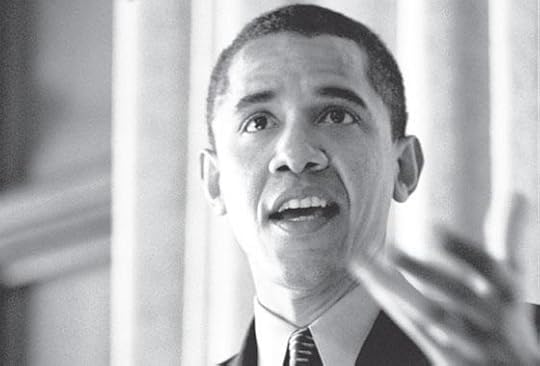
The Young Professor Barack Obama
When Barack Obama arrived at the Law School in 1991, faculty and students alike sensed that he had a bright future ahead of him. As the first African American president of the Harvard Law Review, he was clearly an accomplished scholar with a fine mind and his choice of careers. And once he began teaching, his strong oratorical skills and his ability to communicate complex ideas made his political ambitions appear credible.
Craig Cunningham, ’93, one of the President’s first students and a supporter of his teacher’s political ambitions, felt that Obama was brilliant, talented, and had the potential to be a great leader. But Cunningham was also concerned about Obama’s political future.
“I did expect him to run for office, because I would hang around after class and we would talk about the state senate,” Cunningham explains. “But after he lost the congressional race to Bobby Rush I thought he was moving too fast, that he should slow down and not run for a different office for a while because he was trying to do too much at one time. And Chicago politics were not going to allow him to do that. I was worried. And I was really surprised when he told me he was going to run for U.S. Senate.”
Douglas Baird, the Harry A. Bigelow Distinguished Service Professor of Law and former Dean, shared Cunningham’s concern that winning the seat was a long shot for Obama.
“I remember having a cup of coffee with him when he said he was thinking of running for the U.S. Senate, and I looked at him straight in the eye and said, ‘Don’t do it, you’re not going to win.’
Remainder of article from the University of Chicago law school:
https://www.law.uchicago.edu/news/gre...
Source: University of Chicago


The Young Professor Barack Obama
When Barack Obama arrived at the Law School in 1991, faculty and students alike sensed that he had a bright future ahead of him. As the first African American president of the Harvard Law Review, he was clearly an accomplished scholar with a fine mind and his choice of careers. And once he began teaching, his strong oratorical skills and his ability to communicate complex ideas made his political ambitions appear credible.
Craig Cunningham, ’93, one of the President’s first students and a supporter of his teacher’s political ambitions, felt that Obama was brilliant, talented, and had the potential to be a great leader. But Cunningham was also concerned about Obama’s political future.
“I did expect him to run for office, because I would hang around after class and we would talk about the state senate,” Cunningham explains. “But after he lost the congressional race to Bobby Rush I thought he was moving too fast, that he should slow down and not run for a different office for a while because he was trying to do too much at one time. And Chicago politics were not going to allow him to do that. I was worried. And I was really surprised when he told me he was going to run for U.S. Senate.”
Douglas Baird, the Harry A. Bigelow Distinguished Service Professor of Law and former Dean, shared Cunningham’s concern that winning the seat was a long shot for Obama.
“I remember having a cup of coffee with him when he said he was thinking of running for the U.S. Senate, and I looked at him straight in the eye and said, ‘Don’t do it, you’re not going to win.’
Remainder of article from the University of Chicago law school:
https://www.law.uchicago.edu/news/gre...
Source: University of Chicago
Barack at Miner, Barnhill & Galland
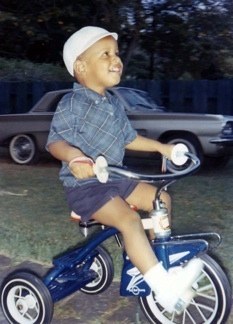
Cute photo of toddler Obama
Obama's law days effective but brief
https://www.latimes.com/archives/la-x...
Source: LA Times

Cute photo of toddler Obama
Obama's law days effective but brief
https://www.latimes.com/archives/la-x...
Source: LA Times
An interesting take on the former President:
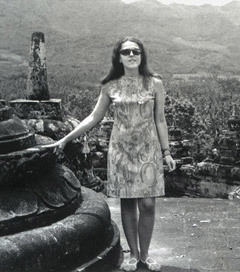
Barack Obama's Young Mother Abroad
Barack, I’ve come to understand, is the sort of person who needs a hole, a closed-off little warren where he can read and write undisturbed. It’s like a hatch that opens directly onto the spacious skies of his brain. Time spent there seems to fuel him. In deference to this, we’ve managed to create some version of a hole inside every home we’ve ever lived in—any quiet corner or alcove will do. To this day, when we arrive at a rental house in Hawaii or on Martha’s Vineyard, Barack goes off looking for an empty room that can serve as the vacation hole. There, he can flip between the six or seven books he’s reading simultaneously and toss his newspapers on the floor. For him, the Hole is a kind of sacred high place, where insights are birthed and clarity comes to visit. For me, it’s an off-putting and disorderly mess. One requirement has always been that the Hole, wherever it is, have a door so that I can shut it. For obvious reasons.
Obama, Michelle. Becoming (p. 181). Crown. Kindle Edition.
Discussion Topic:
1. Did you think that the above segment of the book was both telling about Barack and his idiosyncrasies as well as Michelle as his wife's and/or very telling of the give and take that the Obama's have about giving each other their needed space?

Barack Obama's Young Mother Abroad
Barack, I’ve come to understand, is the sort of person who needs a hole, a closed-off little warren where he can read and write undisturbed. It’s like a hatch that opens directly onto the spacious skies of his brain. Time spent there seems to fuel him. In deference to this, we’ve managed to create some version of a hole inside every home we’ve ever lived in—any quiet corner or alcove will do. To this day, when we arrive at a rental house in Hawaii or on Martha’s Vineyard, Barack goes off looking for an empty room that can serve as the vacation hole. There, he can flip between the six or seven books he’s reading simultaneously and toss his newspapers on the floor. For him, the Hole is a kind of sacred high place, where insights are birthed and clarity comes to visit. For me, it’s an off-putting and disorderly mess. One requirement has always been that the Hole, wherever it is, have a door so that I can shut it. For obvious reasons.
Obama, Michelle. Becoming (p. 181). Crown. Kindle Edition.
Discussion Topic:
1. Did you think that the above segment of the book was both telling about Barack and his idiosyncrasies as well as Michelle as his wife's and/or very telling of the give and take that the Obama's have about giving each other their needed space?
Dreams from My Father
Dreams from My Father was published, finally, in the summer of 1995. It got good reviews yet sold only modestly, but that was okay. The important thing was that Barack had managed to process his life story, snapping together the disparate pieces of his Afro-Kansan-Indonesian-Hawaiian-Chicagoan identity, writing himself into a sort of wholeness this way. I was proud of him. Through the narrative, he’d made a kind of literary peace with his phantom father.
Obama, Michelle. Becoming (p. 181). Crown. Kindle Edition.
 by
by
 Barack Obama
Barack Obama
Dreams from My Father was published, finally, in the summer of 1995. It got good reviews yet sold only modestly, but that was okay. The important thing was that Barack had managed to process his life story, snapping together the disparate pieces of his Afro-Kansan-Indonesian-Hawaiian-Chicagoan identity, writing himself into a sort of wholeness this way. I was proud of him. Through the narrative, he’d made a kind of literary peace with his phantom father.
Obama, Michelle. Becoming (p. 181). Crown. Kindle Edition.
 by
by
 Barack Obama
Barack Obama
Alice Palmer
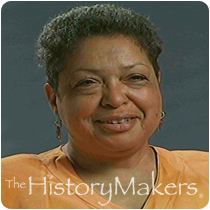
Alice J. Palmer was born on June 20, 1939, in Indianapolis, Indiana. The daughter of Erskine and Mary Ward Roberts, Palmer graduated from high school at age sixteen and enrolled at Indiana University. After an extended leave of absence, Palmer returned to Indiana University to earn her Bachelors degree with the help of four jobs and a scholarship.
After graduating in 1965, Palmer found a teaching position in Indianapolis, Indiana, but soon moved to Chicago to work at Crane Junior College, later called Malcolm X College. She received her Masters degree from Roosevelt University and her Ph.D. from Northwestern University, where she co-authored two books and tutored in the Black House. Palmer remained at Northwestern University to serve as Associate Dean and Director of African American Student Affairs for the next five years. Palmer served as the National Voter Education Director for a national citizen action organization before becoming the founding director of the Metro YMCA Youth and Government Program in 1986. She also served as Executive Director of Chicago Cities in Schools.
On June 6, 1991, Palmer replaced Richard Newhouse in the Illinois Senate, where she served until 1996. While in office, Palmer served on the Appropriations II Committee, among many others. Palmer was replaced by Barack Obama in the state senate. In 1996, Palmer was hired by the University of Illinois at Chicago as an Associate Professor in the College of Urban Planning and Public Affairs.
Palmer was interviewed by The HistoryMakers on June 9, 2000.
Source: History Makers
How Chicago Politics Shaped Obama
https://www.npr.org/templates/story/s...

Alice J. Palmer was born on June 20, 1939, in Indianapolis, Indiana. The daughter of Erskine and Mary Ward Roberts, Palmer graduated from high school at age sixteen and enrolled at Indiana University. After an extended leave of absence, Palmer returned to Indiana University to earn her Bachelors degree with the help of four jobs and a scholarship.
After graduating in 1965, Palmer found a teaching position in Indianapolis, Indiana, but soon moved to Chicago to work at Crane Junior College, later called Malcolm X College. She received her Masters degree from Roosevelt University and her Ph.D. from Northwestern University, where she co-authored two books and tutored in the Black House. Palmer remained at Northwestern University to serve as Associate Dean and Director of African American Student Affairs for the next five years. Palmer served as the National Voter Education Director for a national citizen action organization before becoming the founding director of the Metro YMCA Youth and Government Program in 1986. She also served as Executive Director of Chicago Cities in Schools.
On June 6, 1991, Palmer replaced Richard Newhouse in the Illinois Senate, where she served until 1996. While in office, Palmer served on the Appropriations II Committee, among many others. Palmer was replaced by Barack Obama in the state senate. In 1996, Palmer was hired by the University of Illinois at Chicago as an Associate Professor in the College of Urban Planning and Public Affairs.
Palmer was interviewed by The HistoryMakers on June 9, 2000.
Source: History Makers
How Chicago Politics Shaped Obama
https://www.npr.org/templates/story/s...
Associate Dean of Community Relations - University of Chicago
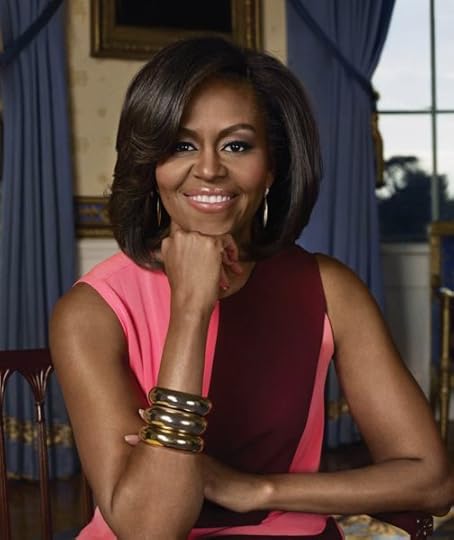
Obama named first Associate Dean of Student Services
Position will build on volunteerism work begun by students Michelle Obama, executive director of the leadership-training organization Public Allies Chicago, has been named Associate Dean of Student Services and Director of the University Community Service Center. Her appointment will begin in September.
Reporting to the Dean of Student Services, Obama will coordinate the University's efforts to make available to students a wide range of service opportunities in the communities around the University as well as throughout the city.
"Michelle understands the Hyde Park community and the world of public service, and her extensive experience in these areas will support and enhance the current efforts by students in these areas," said Arthur Sussman, General Counsel and Vice President for Administration. "She will help our students continue the range of work that has made volunteerism one of the most important extracurricular activities on campus."
Obama's hiring is a result of recommendations made by the Faculty-Student Committee on Volunteerism, chaired by Harold Richman, Director of the Chapin Hall Center for Children and the Hermon Dunlop Smith Professor in the School of Social Service Administration. The committee was itself a response to students' widespread interest in volunteer opportunities and community service and the extensive work in these areas by the student-run University Community Service Center.
Obama has been executive director of Public Allies Chicago since 1991. Public Allies Chicago provides leadership training and development to young adults, ages 18 to 30, who are interested in pursuing careers in the public sector. The program provides 40 participants with a 10-month apprenticeship opportunity working in a not-for-profit organization or government agency in Chicago.
A native of Chicago, Obama received her B.A. in 1985 from Princeton and her J.D. in 1988 from Harvard. Prior to joining Public Allies, she was assistant commissioner in the city of Chicago's department of planning and development from 1992 to 1993 and assistant to the mayor from 1991 to 1992. She previously was an attorney with the Chicago law firm of Sidley & Austin.

Obama named first Associate Dean of Student Services
Position will build on volunteerism work begun by students Michelle Obama, executive director of the leadership-training organization Public Allies Chicago, has been named Associate Dean of Student Services and Director of the University Community Service Center. Her appointment will begin in September.
Reporting to the Dean of Student Services, Obama will coordinate the University's efforts to make available to students a wide range of service opportunities in the communities around the University as well as throughout the city.
"Michelle understands the Hyde Park community and the world of public service, and her extensive experience in these areas will support and enhance the current efforts by students in these areas," said Arthur Sussman, General Counsel and Vice President for Administration. "She will help our students continue the range of work that has made volunteerism one of the most important extracurricular activities on campus."
Obama's hiring is a result of recommendations made by the Faculty-Student Committee on Volunteerism, chaired by Harold Richman, Director of the Chapin Hall Center for Children and the Hermon Dunlop Smith Professor in the School of Social Service Administration. The committee was itself a response to students' widespread interest in volunteer opportunities and community service and the extensive work in these areas by the student-run University Community Service Center.
Obama has been executive director of Public Allies Chicago since 1991. Public Allies Chicago provides leadership training and development to young adults, ages 18 to 30, who are interested in pursuing careers in the public sector. The program provides 40 participants with a 10-month apprenticeship opportunity working in a not-for-profit organization or government agency in Chicago.
A native of Chicago, Obama received her B.A. in 1985 from Princeton and her J.D. in 1988 from Harvard. Prior to joining Public Allies, she was assistant commissioner in the city of Chicago's department of planning and development from 1992 to 1993 and assistant to the mayor from 1991 to 1992. She previously was an attorney with the Chicago law firm of Sidley & Austin.
Leading the Life You Want
https://www.coursera.org/lecture/lead...
Source: Coursera
The Coursera course states the Michelle was able to lead the life that she wanted because of the following: Do you agree or disagree?
Align Actions with Values
Manage Boundaries Intelligently
Embrace Change Courageously
https://www.coursera.org/lecture/lead...
Source: Coursera
The Coursera course states the Michelle was able to lead the life that she wanted because of the following: Do you agree or disagree?
Align Actions with Values
Manage Boundaries Intelligently
Embrace Change Courageously
What to Expect when you are Expecting
 by
by
 Heidi Murkoff
Heidi Murkoff
Synopsis:
Incorporating everything that's new in pregnancy, childbirth, and the lifestyles of parents-to-be, complete with a preconception plan, information on choosing a practitioner, birthing alternatives, second pregnancies, twins, making love while pregnant, and coping with common and not so common pregnancy symptoms.
 by
by
 Heidi Murkoff
Heidi MurkoffSynopsis:
Incorporating everything that's new in pregnancy, childbirth, and the lifestyles of parents-to-be, complete with a preconception plan, information on choosing a practitioner, birthing alternatives, second pregnancies, twins, making love while pregnant, and coping with common and not so common pregnancy symptoms.
Who was Bobby Rush?
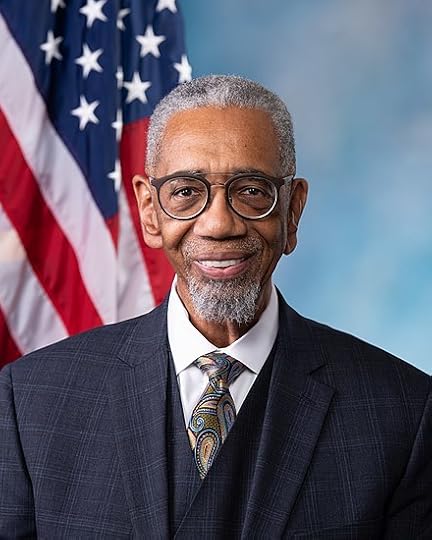
Link to article: https://en.wikipedia.org/wiki/Bobby_Rush
Barack Obama took a lot of heat even from Bobby Rush who was totally over the line with his comments: - “He went to Harvard and became an educated fool. We’re not impressed with these folks with these eastern elite degrees.” He’s not one of us, in other words. Barack wasn’t a real black man, like them—someone who spoke like that, looked like that, and read that many books could never be.
Obama, Michelle. Becoming (pp. 197-198). Crown. Kindle Edition.
Source: Wikipedia

Link to article: https://en.wikipedia.org/wiki/Bobby_Rush
Barack Obama took a lot of heat even from Bobby Rush who was totally over the line with his comments: - “He went to Harvard and became an educated fool. We’re not impressed with these folks with these eastern elite degrees.” He’s not one of us, in other words. Barack wasn’t a real black man, like them—someone who spoke like that, looked like that, and read that many books could never be.
Obama, Michelle. Becoming (pp. 197-198). Crown. Kindle Edition.
Source: Wikipedia
Madelyn Dunham

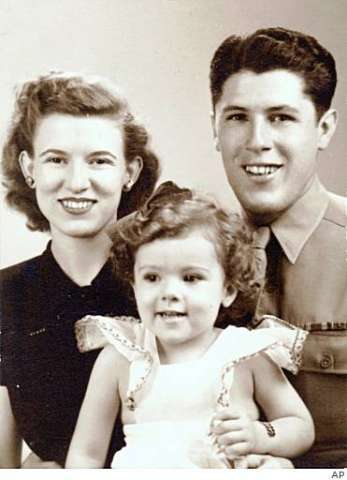
https://en.wikipedia.org/wiki/Madelyn...
Tribute on Youtube:
https://www.youtube.com/watch?v=cXszr...
Public Memorial Service for Madelyn Dunham
https://www.youtube.com/watch?v=a_1re...
News with Madelyn Dunham in Ad for Barack
https://www.youtube.com/watch?v=AX_2K...


https://en.wikipedia.org/wiki/Madelyn...
Tribute on Youtube:
https://www.youtube.com/watch?v=cXszr...
Public Memorial Service for Madelyn Dunham
https://www.youtube.com/watch?v=a_1re...
News with Madelyn Dunham in Ad for Barack
https://www.youtube.com/watch?v=AX_2K...
Susan Sher

Former Chief of Staff to First Lady Michelle Obama; First Female Corporation Counsel for the City of Chicago
Spent a decade in the healthcare industry as former VP for the legal and governmental affairs at the University of Chicago Hospitals and Health System
Former lead attorney for Chicago Mayor Richard M. Daley
Draws on her experience to address health care, current political issues, and the inner-workings of the White House
Link to video: https://www.leadingauthorities.com/sp...
Source: Leading Authorities

Former Chief of Staff to First Lady Michelle Obama; First Female Corporation Counsel for the City of Chicago
Spent a decade in the healthcare industry as former VP for the legal and governmental affairs at the University of Chicago Hospitals and Health System
Former lead attorney for Chicago Mayor Richard M. Daley
Draws on her experience to address health care, current political issues, and the inner-workings of the White House
Link to video: https://www.leadingauthorities.com/sp...
Source: Leading Authorities
July 27, 2004
C-SPAN: Barack Obama Speech at 2004 DNC Convention

Boy doesn't Barack Obama look young?
The Speech that made Obama
Link: https://www.youtube.com/watch?v=eWynt...
Source: Youtube and C-Span
C-SPAN: Barack Obama Speech at 2004 DNC Convention

Boy doesn't Barack Obama look young?
The Speech that made Obama
Link: https://www.youtube.com/watch?v=eWynt...
Source: Youtube and C-Span
The Audacity of Hope
 by
by


Synopsis:
The Audacity of Hope is Barack Obama's call for a new kind of politics—a politics that builds upon those shared understandings that pull us together as Americans. Lucid in his vision of America's place in the world, refreshingly candid about his family life and his time in the Senate, Obama here sets out his political convictions and inspires us to trust in the dogged optimism that has long defined us and that is our best hope going forward.
 by
by


Synopsis:
The Audacity of Hope is Barack Obama's call for a new kind of politics—a politics that builds upon those shared understandings that pull us together as Americans. Lucid in his vision of America's place in the world, refreshingly candid about his family life and his time in the Senate, Obama here sets out his political convictions and inspires us to trust in the dogged optimism that has long defined us and that is our best hope going forward.
Hurricane Katrina
Hurricane Katrina Day by Day | National Geographic
Link: https://youtu.be/HbJaMWw4-2Q
Source: Youtube and National Geographic
Hurricane Katrina Day by Day | National Geographic
Link: https://youtu.be/HbJaMWw4-2Q
Source: Youtube and National Geographic
David Axelrod

It’s hard to avoid the cynical side of politics. It got to points where I thought about quitting because I didn’t want to succumb to that. One was in 2002. I was going through this sort of existential crisis when Barack Obama called. He had lost to Bobby Rush by 30 points in a race for Congress and was at a crossroads. He said, “I’ve got one race left in me. I promised Michelle I’ll get a real job if this doesn’t pan out, but I want to run for the U.S. Senate.” That race helped reinvigorate me.
Going through a presidential campaign at a very high level is an extraordinarily demanding, taxing deal. Your mind is racing 24 hours a day, you don’t sleep, you don’t eat well, you’re traveling constantly, you’re under constant pressure. Now I have two grandchildren, and I don’t want to do that again.
I have a lot of regrets about the sacrifices I inflicted on my wife and children when I was pursuing my career. I persuaded myself that it was important to do. Now I look back and realize there were actually more important things I needed to do, and the fact that I didn’t make time for those things is a source of embarrassment and shame.
The higher you go in politics, if you’re not able to reveal who you are, you’re not going to succeed. I think Hillary Clinton learned that in the last election. With Donald Trump, for all of his shortcomings, you never hear anybody say, “Gee, I wish he’d just speak his mind.” I said a long time ago that presidential campaigns are like MRIs for the soul. Whoever you are, people find out. And if you try to hide it, they know that, too.
Seeing Ed Burke topple is like watching a statue in Grant Park be pulled down. But these revelations are healthy reminders that times have changed and government should change with them.
The years I spent as a journalist were some of the best of my life. I lived for the story. From the time I woke up to the time I went to sleep, I was thinking: Did I miss something? Is there a call I haven’t made? A lot of skills I learned were essential to my work in politics, the first of which is narrative. Campaigns are about telling a story of who you are and where you want to lead. So you learn how to ask questions and what questions to ask. But people will surprise you with the answers. If you’re a reporter and you’re no longer ready to be surprised, it’s time not to be a reporter anymore.
I got married when I was 24. It was probably too young, but I met the woman of my dreams. Susan is a very independent woman, and that’s what attracted me to her. She has always been willing to be candid with me. I trust her judgment more than anybody else’s.
Two years after getting married, we had a daughter, Lauren, who had very serious epilepsy. It consumed us for many years. When I was Obama’s political adviser and we were working on the Affordable Care Act, the best political advice was, “Don’t do this because it’s risky, and we have a lot of things going on right now. Seven presidents have tried this. Seven have failed.” But the other part of me had almost gone bankrupt when I was a young reporter and insurance wouldn’t cover Lauren’s medications and other things she needed. We were paying a thousand dollars a month out of pocket, and we couldn’t change providers because she had a preexisting condition. The care she got probably saved her life, but I had experienced the worst of the health care system.
The night the Affordable Care Act passed, I wept. We were all together in the White House, and I went into my office, closed the door, and cried. Because of what the president had done, and what we had done to help him, there were kids and families that wouldn’t have to go through what my family went through. And that made everything real.
Source: Chicago Interview - http://www.chicagomag.com/Chicago-Mag...

It’s hard to avoid the cynical side of politics. It got to points where I thought about quitting because I didn’t want to succumb to that. One was in 2002. I was going through this sort of existential crisis when Barack Obama called. He had lost to Bobby Rush by 30 points in a race for Congress and was at a crossroads. He said, “I’ve got one race left in me. I promised Michelle I’ll get a real job if this doesn’t pan out, but I want to run for the U.S. Senate.” That race helped reinvigorate me.
Going through a presidential campaign at a very high level is an extraordinarily demanding, taxing deal. Your mind is racing 24 hours a day, you don’t sleep, you don’t eat well, you’re traveling constantly, you’re under constant pressure. Now I have two grandchildren, and I don’t want to do that again.
I have a lot of regrets about the sacrifices I inflicted on my wife and children when I was pursuing my career. I persuaded myself that it was important to do. Now I look back and realize there were actually more important things I needed to do, and the fact that I didn’t make time for those things is a source of embarrassment and shame.
The higher you go in politics, if you’re not able to reveal who you are, you’re not going to succeed. I think Hillary Clinton learned that in the last election. With Donald Trump, for all of his shortcomings, you never hear anybody say, “Gee, I wish he’d just speak his mind.” I said a long time ago that presidential campaigns are like MRIs for the soul. Whoever you are, people find out. And if you try to hide it, they know that, too.
Seeing Ed Burke topple is like watching a statue in Grant Park be pulled down. But these revelations are healthy reminders that times have changed and government should change with them.
The years I spent as a journalist were some of the best of my life. I lived for the story. From the time I woke up to the time I went to sleep, I was thinking: Did I miss something? Is there a call I haven’t made? A lot of skills I learned were essential to my work in politics, the first of which is narrative. Campaigns are about telling a story of who you are and where you want to lead. So you learn how to ask questions and what questions to ask. But people will surprise you with the answers. If you’re a reporter and you’re no longer ready to be surprised, it’s time not to be a reporter anymore.
I got married when I was 24. It was probably too young, but I met the woman of my dreams. Susan is a very independent woman, and that’s what attracted me to her. She has always been willing to be candid with me. I trust her judgment more than anybody else’s.
Two years after getting married, we had a daughter, Lauren, who had very serious epilepsy. It consumed us for many years. When I was Obama’s political adviser and we were working on the Affordable Care Act, the best political advice was, “Don’t do this because it’s risky, and we have a lot of things going on right now. Seven presidents have tried this. Seven have failed.” But the other part of me had almost gone bankrupt when I was a young reporter and insurance wouldn’t cover Lauren’s medications and other things she needed. We were paying a thousand dollars a month out of pocket, and we couldn’t change providers because she had a preexisting condition. The care she got probably saved her life, but I had experienced the worst of the health care system.
The night the Affordable Care Act passed, I wept. We were all together in the White House, and I went into my office, closed the door, and cried. Because of what the president had done, and what we had done to help him, there were kids and families that wouldn’t have to go through what my family went through. And that made everything real.
Source: Chicago Interview - http://www.chicagomag.com/Chicago-Mag...
David Plouffe
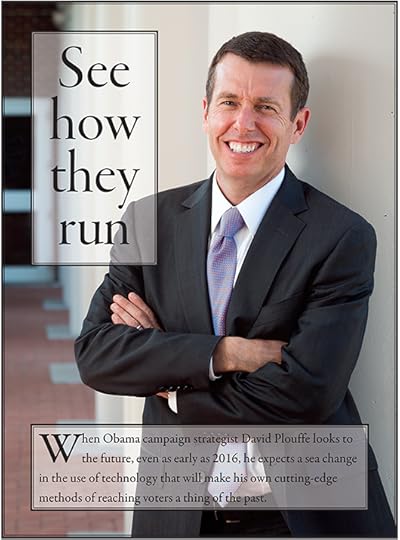
CHICAGO TONIGHT
Guest: David Plouffe
Clip: Season 2009 | 25m 17s
Carol Marin sits down with David Plouffe, the campaign manager for President Obama's historic election
Link: https://www.pbs.org/video/chicago-ton...
Source: Youtube - Friday Night Show
The Audacity to Win
 by David Plouffe (no photo)
by David Plouffe (no photo)
Synopsis:
David Plouffe not only led the effort that put Barack Obama in the White House, but he also changed the face of politics forever and reenergized the idea of democracy itself. The Audacity to Win is his story of that groundbreaking achievement, taking readers inside the remarkable campaign that led to the election of the first African American president.
For two years Plouffe worked side by side with Obama, charting the course of the campaign. His is the ultimate insider’s tale, revealing both the strategies that delivered Obama to office and how the candidate and campaign handled moments of great challenge and opportunity. Moving from the deliberations about whether to run at all, through the epic primary battle with Hillary Clinton and the general election against John McCain, Plouffe showcases the high-wire gamesmanship that fascinated pundits and the drama and intrigue that captivated a nation.
The Audacity to Win chronicles the arrival of a new moment in American life at the convergence of digital technology and grassroots organization, and the exciting possibilities revealed by a campaign that in many ways functioned as a $1 billion start-up with laser-like focus and discipline. In this extraordinary book, David Plouffe unfolds one of the most important political stories of our time, one whose lessons are not limited to politics, but reach to the greatest heights of what we dream about for our country and ourselves.

CHICAGO TONIGHT
Guest: David Plouffe
Clip: Season 2009 | 25m 17s
Carol Marin sits down with David Plouffe, the campaign manager for President Obama's historic election
Link: https://www.pbs.org/video/chicago-ton...
Source: Youtube - Friday Night Show
The Audacity to Win
 by David Plouffe (no photo)
by David Plouffe (no photo)Synopsis:
David Plouffe not only led the effort that put Barack Obama in the White House, but he also changed the face of politics forever and reenergized the idea of democracy itself. The Audacity to Win is his story of that groundbreaking achievement, taking readers inside the remarkable campaign that led to the election of the first African American president.
For two years Plouffe worked side by side with Obama, charting the course of the campaign. His is the ultimate insider’s tale, revealing both the strategies that delivered Obama to office and how the candidate and campaign handled moments of great challenge and opportunity. Moving from the deliberations about whether to run at all, through the epic primary battle with Hillary Clinton and the general election against John McCain, Plouffe showcases the high-wire gamesmanship that fascinated pundits and the drama and intrigue that captivated a nation.
The Audacity to Win chronicles the arrival of a new moment in American life at the convergence of digital technology and grassroots organization, and the exciting possibilities revealed by a campaign that in many ways functioned as a $1 billion start-up with laser-like focus and discipline. In this extraordinary book, David Plouffe unfolds one of the most important political stories of our time, one whose lessons are not limited to politics, but reach to the greatest heights of what we dream about for our country and ourselves.
Datsun

Discussion Topics:
1. So much of what we have learned about Michelle is vastly different than how she is sometimes portrayed by the media and yet some of the revelations about Barack are too - the Hole that he needs to find in every abode or vacation place that he can relax into - a place where he can burrow and not neatly, his frugality, the Datsun with the hole in the floor (lol), the family interview where he was wearing the worn belt, the ten year pair of pants and the scuffed shoes. What were your thoughts about Michelle's assessment that - "No one else could run my programs at the hospital. No one else could campaign as Barack Obama’s wife. No one could fill in as Malia and Sasha’s mother at bedtime. But maybe Sam Kass could cook some dinners for us."
Obama, Michelle. Becoming (p. 239). Crown. Kindle Edition.

Discussion Topics:
1. So much of what we have learned about Michelle is vastly different than how she is sometimes portrayed by the media and yet some of the revelations about Barack are too - the Hole that he needs to find in every abode or vacation place that he can relax into - a place where he can burrow and not neatly, his frugality, the Datsun with the hole in the floor (lol), the family interview where he was wearing the worn belt, the ten year pair of pants and the scuffed shoes. What were your thoughts about Michelle's assessment that - "No one else could run my programs at the hospital. No one else could campaign as Barack Obama’s wife. No one could fill in as Malia and Sasha’s mother at bedtime. But maybe Sam Kass could cook some dinners for us."
Obama, Michelle. Becoming (p. 239). Crown. Kindle Edition.
Sam Kass
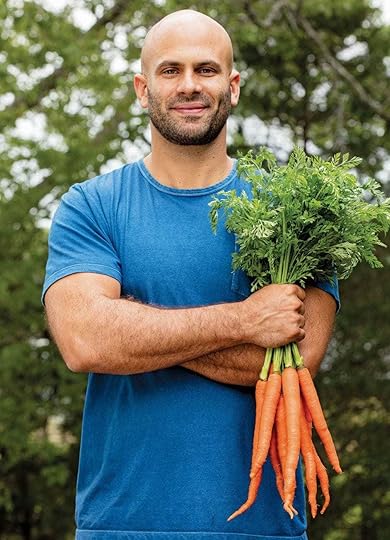
Former White House chef Sam Kass wants you to eat healthier, one plate at a time
Link to article: https://www.washingtonpost.com/expres...
Source: The Washington Post
 by Sam Kass (no photo)
by Sam Kass (no photo)
Synopsis:
Sam Kass, former chef to the Obamas and White House food policy advisor, makes it easier to do a little better for your diet--and the environment--every day, through smart ways to think about shopping, setting up your kitchen so the healthy stuff comes to hand most naturally, and through 90 delicious, simple recipes.
This book lays out Kass's plan to eat a little better. Knowing that sustainability and healthfulness come most, well, sustainably when new habits and choices seem appealing rather than drastic and punitive, Kass shares his philosophy and methods to help make it easy to choose, cook, and eat delicious foods without depriving yourself of agency or pleasure. He knows that going organic, local, and so forth all the time is just not realistic for most people, and that's ok--it's all about choosing and doing a little better, and how those choices add up to big change. It's the philosophy he helped the Obamas instill in their home, both in Chicago and that big white one in Washington.

Former White House chef Sam Kass wants you to eat healthier, one plate at a time
Link to article: https://www.washingtonpost.com/expres...
Source: The Washington Post
 by Sam Kass (no photo)
by Sam Kass (no photo)Synopsis:
Sam Kass, former chef to the Obamas and White House food policy advisor, makes it easier to do a little better for your diet--and the environment--every day, through smart ways to think about shopping, setting up your kitchen so the healthy stuff comes to hand most naturally, and through 90 delicious, simple recipes.
This book lays out Kass's plan to eat a little better. Knowing that sustainability and healthfulness come most, well, sustainably when new habits and choices seem appealing rather than drastic and punitive, Kass shares his philosophy and methods to help make it easy to choose, cook, and eat delicious foods without depriving yourself of agency or pleasure. He knows that going organic, local, and so forth all the time is just not realistic for most people, and that's ok--it's all about choosing and doing a little better, and how those choices add up to big change. It's the philosophy he helped the Obamas instill in their home, both in Chicago and that big white one in Washington.
Some other Discussion Questions to think about:
1. There is an oft-cited maxim in the black community: You’ve got to be twice as good to get half as far. Mrs. Obama said the First Family felt the weight of that statement when they moved into the White House, “Any error or lapse in judgement, we knew, would be magnified, read as something more than what it was.” What is the reality rooted in that twice as good/half as far maxim that so many parents pass on to their children? Why and how would that maxim feel familiar to some and surprising to others?
2. Malia and Sasha Obama were young children when their father was elected president. How did the Obamas balance the need to protect their daughters’ safety with the desire to allow them to grow and become independent? How do you handle the pressures of the outside world with the children in your life?
1. There is an oft-cited maxim in the black community: You’ve got to be twice as good to get half as far. Mrs. Obama said the First Family felt the weight of that statement when they moved into the White House, “Any error or lapse in judgement, we knew, would be magnified, read as something more than what it was.” What is the reality rooted in that twice as good/half as far maxim that so many parents pass on to their children? Why and how would that maxim feel familiar to some and surprising to others?
2. Malia and Sasha Obama were young children when their father was elected president. How did the Obamas balance the need to protect their daughters’ safety with the desire to allow them to grow and become independent? How do you handle the pressures of the outside world with the children in your life?
All, the moderator has added all urls, posts, discussion questions for the entire reading for this week. This thread is up to date.
Please post and dive into responding to the discussion questions or anything though the end of Chapter 16.
You may find a quote that is particularly meaningful to you. If so, post the quote and tell us the Chapter and page number if you can. And explain why it was so powerful for you or enlightening.
What makes a discussion fun is for you to try your hand at all of the discussion questions - one at a time and really think about the book itself.
Remember the discussion questions are found throughout each thread - refer to messages 6, 7, 8 and 9. Also 18, 37 and 39. There is a lot here to discuss.
Please post and dive into responding to the discussion questions or anything though the end of Chapter 16.
You may find a quote that is particularly meaningful to you. If so, post the quote and tell us the Chapter and page number if you can. And explain why it was so powerful for you or enlightening.
What makes a discussion fun is for you to try your hand at all of the discussion questions - one at a time and really think about the book itself.
Remember the discussion questions are found throughout each thread - refer to messages 6, 7, 8 and 9. Also 18, 37 and 39. There is a lot here to discuss.
Books mentioned in this topic
Eat a Little Better: Great Flavor, Good Health, Better World: A Cookbook (other topics)The Audacity to Win: The Inside Story and Lessons of Barack Obama's Historic Victory (other topics)
The Audacity of Hope: Thoughts on Reclaiming the American Dream (other topics)
What to Expect When You're Expecting (other topics)
Dreams from My Father (other topics)
More...
Authors mentioned in this topic
Sam Kass (other topics)David Plouffe (other topics)
Barack Obama (other topics)
Heidi Murkoff (other topics)
Barack Obama (other topics)
More...


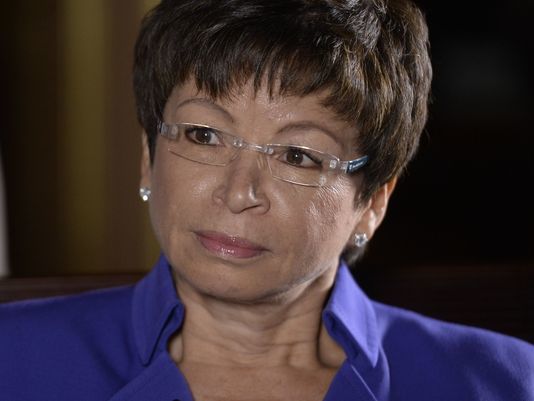
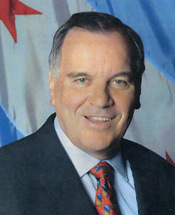
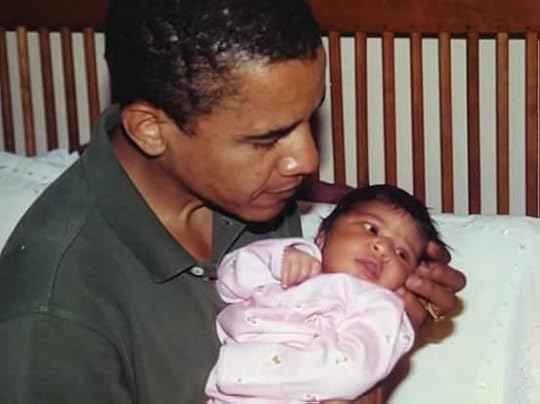
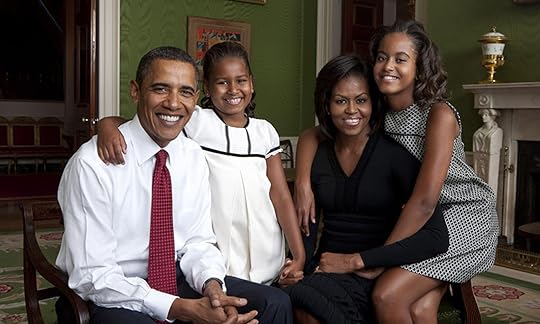

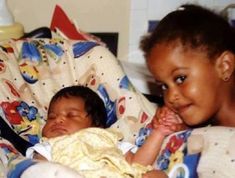
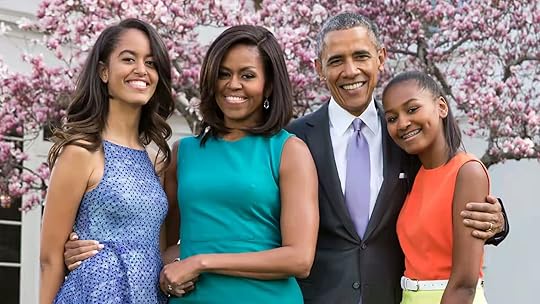
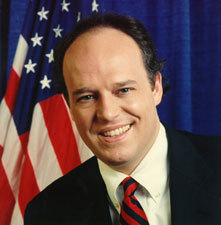


Hello Everyone,
For the week of March 18th - March 24th, we are reading approximately Chapters Thirteen, Fourteen, Fifteen and Sixteen..
WEEK FOUR - March 18th - March 24th -> Chapters Thirteen through Sixteen
Week Four - March 18th - March 24th
Becoming Us
Chapter Thirteen - 175
Chapter Fourteen - 191
Chapter Fifteen - 208
Chapter Sixteen - 227
Photograph Insert - 249
We will open up a thread for each week's reading. Please make sure to post in the particular thread dedicated to those specific chapters and page numbers to avoid spoilers. We will also open up supplemental threads as we did for other spotlighted books.
This book was kicked off February 25th.
We look forward to your participation. Amazon, Barnes and Noble, other noted on line booksellers do have copies of the book and shipment can be expedited. The book can also be obtained easily at your local library, or on your Kindle.
There is no rush and we are thrilled to have you join us. It is never too late to get started and/or to post.
Bentley will be moderating this selection.
Welcome,
~Bentley
TO ALWAYS SEE ALL WEEKS' THREADS SELECT VIEW ALL
REMEMBER NO SPOILERS ON THE WEEKLY NON SPOILER THREADS - ON EACH WEEKLY NON SPOILER THREAD - WE ONLY DISCUSS THE PAGES ASSIGNED OR THE PAGES WHICH WERE COVERED IN PREVIOUS WEEKS. IF YOU GO AHEAD OR WANT TO ENGAGE IN MORE EXPANSIVE DISCUSSION - POST THOSE COMMENTS IN ONE OF THE SPOILER THREADS. THESE CHAPTERS HAVE A LOT OF INFORMATION SO WHEN IN DOUBT CHECK WITH THE CHAPTER OVERVIEW AND SUMMARY TO RECALL WHETHER YOUR COMMENTS ARE ASSIGNMENT SPECIFIC. EXAMPLES OF SPOILER THREADS ARE THE GLOSSARY, THE BIBLIOGRAPHY, THE INTRODUCTION AND THE BOOK AS A WHOLE THREADS.
Notes:
It is always a tremendous help when you quote specifically from the book itself and reference the chapter and page numbers when responding. The text itself helps folks know what you are referencing and makes things clear.
Citations:
If an author or book is mentioned other than the book and author being discussed, citations must be included according to our guidelines. Also, when citing other sources, please provide credit where credit is due and/or the link. There is no need to re-cite the author and the book we are discussing however.
Here is the link to the thread titled Mechanics of the Board which will help you with the citations and how to do them.
http://www.goodreads.com/topic/show/2...
Also, the citation thread: (for Unreasonable Men - look at examples)
https://www.goodreads.com/topic/show/...
Introduction Thread:
https://www.goodreads.com/topic/show/...
Table of Contents and Syllabus
https://www.goodreads.com/topic/show/...
Glossary
Remember there is a glossary thread where ancillary information is placed by the moderator. This is also a thread where additional information can be placed by the group members regarding the subject matter being discussed.
Here is the link:
https://www.goodreads.com/topic/show/...
Bibliography
There is a Bibliography where books cited in the text are posted with proper citations and reviews. We also post the books that the author may have used in his research or in her notes. Please also feel free to add to the Bibliography thread any related books, etc with proper citations or other books either non fiction or historical fiction that relate to the subject matter of the book itself. In the case of this book, Michelle Obama did not have an internal bibliography. No self promotion, please.
Here is the link:
https://www.goodreads.com/topic/show/...
Book as a Whole and Final Thoughts - Spoiler Thread
Here is the link:
https://www.goodreads.com/topic/show/...